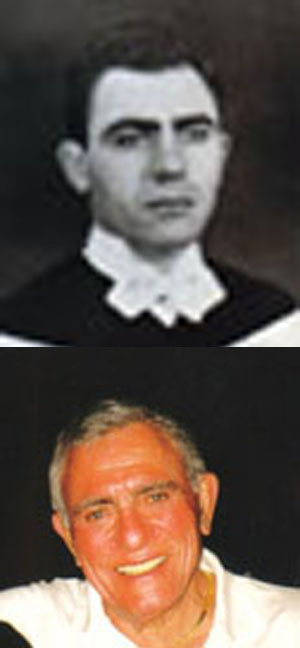In Alfred Petrone’s prime, in the days of assize courts, capital punishment, no disclosure, and before bail reform, a good criminal defence lawyer needed to be something of a gunslinger.

And there was no one better than Petrone at gathering ammunition with which to defend his clients.
In doing so, the Thunder Bay lawyer helped to usher in some of the most significant legal reforms of his generation, including the abolition of the death penalty and the introduction of legal aid.
“He was really a titan for the bar,” says his former partner John Hornak. “The courts aren’t going to be the same.”
Petrone died this month from complications related to pneumonia. He was 84.
His wife, Celina Reitberger, was articling for the Crown in 1980 when she met Petrone in court.
“He was very charismatic and, of course, he’s brilliant,” she says.
He was particularly proud of his inclusion in Learned Friends: A Tribute to Fifty Remarkable Ontario Advocates, 1950-2000, published by the Advocates’ Society, Reitberger notes.
The book recounts how Petrone once arrived at court with a sleeping bag packed with 117 kilograms of potatoes, the same weight as the body his client was accused of heaving into a freezer.
“Petrone’s point was that his client, a slight fellow, wasn’t capable of the lifting job on his own,” the book said. “After much argument, the judge threw the potatoes out of the courtroom. Petrone still managed to win a reduced sentence for his client.”
His success rate was remarkable.
Petrone took on more than 70 murder trials, the vast majority of which he won either with acquittals or convictions on reduced charges, says Charlie Wilkins, a Thunder Bay writer who began recording Petrone’s accounts of his legal exploits last year.
Petrone’s first murder trial, a year after setting up a one-man practice in Port Arthur, Ont., in 1953, would prove to be landmark.
His client was convicted of murdering his son and sentenced to hang. On the day of the scheduled execution, Petrone was with the man when the death sentence was commuted.
“He was sitting with the guy in his Port Arthur cell as it was commuted, as they were building gallows outside,” Wilkins says.
It would turn out to be the last time a death sentence was handed down in Canada, he adds.
“He considered the death penalty barbaric,” he says. “He toured the country and beseeched politicians and bureaucrats and judges and other lawyers to have the death penalty taken off the books.”
Wilkins says Petrone, along with a handful of other Canadian lawyers, was instrumental in bringing an end to capital punishment, an accomplishment the late lawyer called his greatest.
There were many others.
In the early years of his career, Petrone turned away few accused, including many aboriginals.
His clients had varying abilities to pay for his services.
“They would pay him with fish or moose meat or produce,” Hornak says.
His belief in pro bono work didn’t fade throughout his career and he became a strong advocate for a provincial legal aid system.
Inside the courtroom, Petrone’s oratorical prowess became legendary, particularly in addressing juries.
“He knew how to look into their eyes and look into their souls and get across what he needed to,” Hornak says.
In 1997, Petrone came out of retirement to defend Joe Pintar in a double manslaughter trial.
The accused man claimed he shot the two men outside his home in self-defence.
After Petrone rose to give his closing address, he stood silent in front of the jury for 30 seconds or so, Wilkins says.
Suddenly, he let loose a profanity-laced outburst, screaming death threats at jurors.
Petrone then explained his client faced just that kind of menace on the night of the killings.
At that point, Wilkins says, the Crown attorney leaned over to Petrone’s co-counsel and said, “It’s over.”
The jury acquitted Pintar.
Self-defence was an argument that Petrone helped to shape in law, Wilkins adds.
Seven of his clients charged with first-degree murder were female, one of whom was acquitted of shooting her husband on the grounds of self-defence.
“The notion that women had been abused was not yet recognized as a defence by the courts,” Wilkins says.
Petrone would leave no stone unturned in search of defences to unearth, he adds.
The Advocates’ Society publication also tells of a client who claimed a fatal shooting was accidental after a warning shot ricocheted off the floor.
“[Legal assistant] Duffield and Petrone searched the murder scene for hours until they found the groove in the floor from the flying bullet. Petrone used the evidence to beat the first-degree murder charge.”
One of Petrone’s common adversaries in trials was also one of his best friends: William Maloney, a former Ontario Supreme Court justice whom Petrone eulogized in 2004.
Maloney’s son James, a lawyer with Hughes Amys LLP in Toronto, says the pair’s legal bouts should serve as examples to the profession now grappling with issues of civility.
“They were best friends and they fought hundreds of battles,” Maloney says. “It was the way law should be practised. They fought hard and were good friends.”

 And there was no one better than Petrone at gathering ammunition with which to defend his clients.
And there was no one better than Petrone at gathering ammunition with which to defend his clients.